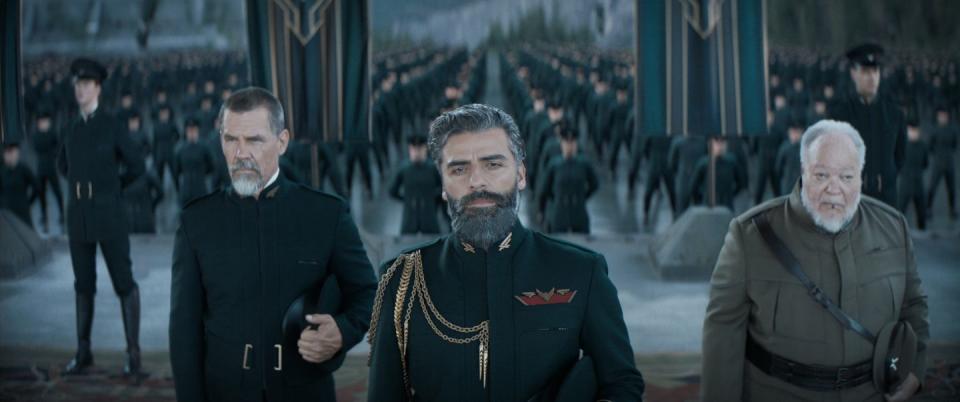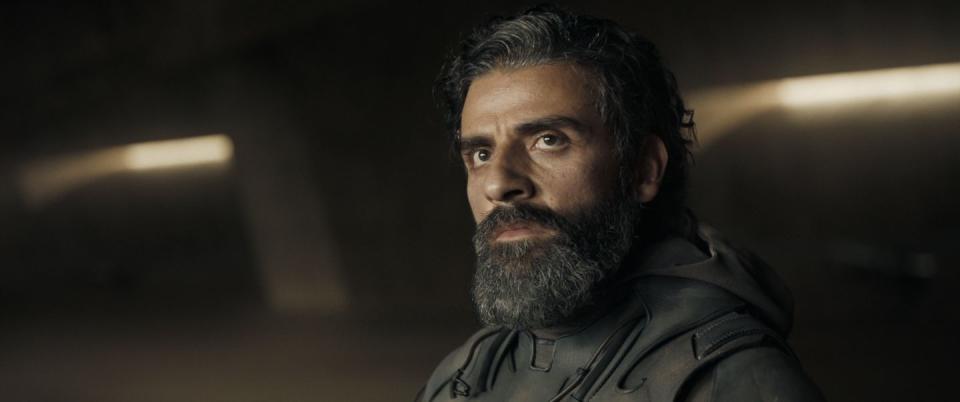Dune review: An ambitious, yet frustrating, adaptation

- Oops!Something went wrong.Please try again later.
Dune has been adapted for the screen before with mixed results, but Denis Villeneuve's attempt is the most ambitious of them all – and the one with most riding on it.
As a fan of Frank Herbert's seminal sci-fi novel, Villeneuve refused to squish the novel into one movie like David Lynch did in 1984. Warner Bros agreed to a two-part adaptation, like it did with Stephen King's It, but it's up to the first part to ensure that Villeneuve gets to return to complete his vision.
The director is confident that the studio is happy with his first movie and wants the sequel, yet he's admitted that it's still a numbers game. Villeneuve has been stung at the box office before with Blade Runner 2049, so could Dune – or Dune: Part One as it's called on screen – prove to be second time lucky?
While we've had to wait for it to arrive, Dune has now arrived in cinemas and there's plenty to savour in this version. Ultimately though, it's a bit of a frustrating watch as it's very much a story half-told.

Working with Jon Spaihts and Eric Roth, Villeneuve has adapted roughly half of Herbert's best-selling novel for Dune: Part One. It's a considerable task as even though it's only half of the story, there's a dense and complex world to establish.
Paul Atreides (Timothée Chalamet) is about to have his life changed when his father, Duke Leto Atreides (Oscar Isaac) accepts control of desert planet Arrakis. It's the source of "spice", the most valuable substance in the universe for its life-enhancing properties, but Leto knows the new assignment is a trap set by his enemies.
The planet of Arrakis alone would be a daunting task to adapt as there's conflict with the Fremen natives to establish alongside the spice mining and some giant deadly sandworms. However, the movie also has to set up the enemies of the Atreides family, including the horrific Baron Harkonnen (Stellan Skarsgård), and the Bene Gesserit religious sect who have a key role in Paul's ultimate destiny.
It's a lot to be juggled as it's all important background to Dune's main 'chosen one' arc of Paul. Aware that he's only telling half of the story, Villeneuve also uses Paul's prophetic dreams to tease what's to come if he gets to tell the rest of the story. For fans and newcomers alike, they're exciting glimpses of events to come and work in much the same way as the MCU teases future events.

To the writers' credit, Dune: Part One is rarely confusing for newcomers in spite of the sheer wealth of information. There might be smaller details only captured by fans or on a second viewing, yet in utilising the two-part approach, Herbert's world is brilliantly realised on screen.
However, while it's commendable that Villeneuve has given the world time to breathe on screen, it does affect the pacing. Dune: Part One clocks in at a weighty 155 minutes and for large parts, there feels to be minimal forward momentum as time is spent on exposition and world-building.
It's something that works better on the page than it does on screen and it's exacerbated by the fact that we're only seeing half of the story. Fans who know where it's going might feel more lenient towards the measured pacing, but for others, it will feel like just as the movie starts getting going towards something, it ends.
This won't be an issue if we do see a Part Two as it's no different to how the likes of Lord of the Rings and It told one complete story over multiple movies. The problem is that even in a 'normal' world, Dune would be a difficult sell at the box office, so you can't help worrying that this is all we're going to see.

That doesn't mean Dune: Part One is an unsatisfying watch, whether or not that second part is released in the coming years.
As to be expected with Villeneuve, it's a classy and beautifully executed sci-fi with a terrific score by Hans Zimmer. As a big-screen outing, the movie is gorgeous to behold, and you can understand why the director would be worried that some of that awe will be lost on a smaller screen.
While it might not be an action-heavy offering, the set pieces don't disappoint when Villeneuve unleashes them, such as a dramatic sandworm attack and an explosive nighttime assault. There's political intrigue and an emotional weight to proceedings that mean they're not just empty thrills. With Part Two set to up the ante, it's an exciting prospect.
The set pieces provide a welcome diversion from the exposition and the sometimes overly serious tone of the movie. At times, it feels as though everyone is a bit miserable in Arrakis and weighed down by either destiny or an ominous future. It doesn't mean we want Star Wars quips, but when everybody is sombre and not much is going on, Dune: Part One isn't the most enticing of watches.

It's fortunate that Villeneuve has an exceptional cast to fall back on who live up to their billing as one of the best ensembles of the year. Most are playing roles we know they're capable of – David Dastmalchian as a slightly creepy villain, for instance – but they fit perfectly into this world. There's not a single person we'd back to seriously say "desert power" without any irony than Oscar Isaac.
Chalamet slightly suffers from a familiar 'chosen one' role, but has the natural charisma to keep you on side as he broods endlessly. His standout moment comes with the exceptional Gom Jabbar Test of Humanity sequence, Chalamet selling an outlandish concept and holding his own against the always-wonderful Charlotte Rampling.
Anyone going to see Dune: Part One for Zendaya will be disappointed though because, as she's been saying, Chani barely features in the movie. She gets the opening narration, but is otherwise a peripheral figure. As with prophetic glimpses that Paul sees throughout, Chani will be a major player in the second movie – assuming we get there, of course.
And that's the overriding feeling you'll be left with when the movie ends just as all the pieces have slotted into place. It feels frustrating as it's a story half-told, but if Villeneuve gets to complete his vision, then the heavy expositional lifting will feel a worthwhile endeavour.
There's a lot to admire in Dune: Part One, especially in terms of the impressive world-building and the excellent cast. However, you're left thinking about how good the second part will be, rather than being totally fulfilled with this movie. Let's hope this isn't our only visit to Arrakis.
Dune is out now in cinemas and will also be available to watch on HBO Max in the US.
You Might Also Like

